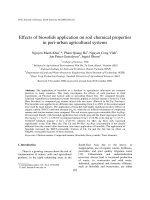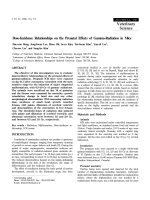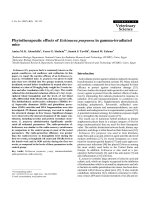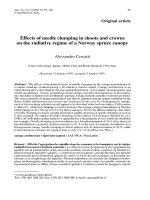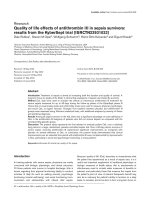Positive effects of games application in teaching pronunciation in vus centers graduation paper, major english language
Bạn đang xem bản rút gọn của tài liệu. Xem và tải ngay bản đầy đủ của tài liệu tại đây (1.92 MB, 57 trang )
HO CHI MINH CITY UNIVERSITY OF FOREIGN LANGUAGES INFORMATION TECHNOLOGY
DEPARTMENT OF FOREIGN LANGUAGES
GRADUATION PAPER
POSITIVE EFFECTS OF GAMES APPLICATION IN
TEACHING PRONUNCIATION IN VUS CENTERS
Advisor: NGUYEN HUY KHAI, M.A
Student name: TRAN THAO MY
Student’s ID: 15DH710347
Class: SA1502
Major: English language
Ho Chi Minh City, June 2019
ACKNOWLEDGEMENTS
It is impossible for this research to be completed without the support, assistance,
contribution, and guidance of these special people. The researcher would like to
send the appreciation to these followings:
Department of Foreign Languages, HCMC University of Foreign Languages and
Information Technology for allowing this research to be recognized.
Mr. Nguyen Huy Khai (M.A), an enthusiastic advisor, who gave me step-by-step
instructions for this research to be finished in details.
Mr. Le Hoang Duy, for being a friend who encouraged and assisted me to solve
problems while the research was being conducted.
Ms. Tran Thanh Truc (M.A), for encouraging and giving me advice when needed.
Ms. Tran Kim Thy, Training Quality Manager of VUS Kids Tran Nao Campus, for
allowing this research’s experiment to be conducted in the campus.
VUS’s teachers and staffs for supporting me to carry out the research successfully.
VUS’ learners for the enthusiastic participation in the experiment and the interview.
All my family members and friends who support, motivate and encourage the
researcher until the end.
ABSTRACT
Games application is used popularly in most of English centers in Vietnam.
It has been known as a great tool in attracting young learners and imparting
knowledge. Furthermore, it also assists children to learn English and communicate
with each other better in a more natural way. However, the number of reliable
research has been done in Vietnam is minor. Therefore, the demand for practical
experiments and further study has been rising. This paper examined how far games
application could have positive effects on teaching pronunciation. In addition,
learners’ attitude towards in-class activities was also recorded to support the idea.
All of the subjects participating in the experiment which was conducted in a campus
of VUS centers were at the beginning level of English proficiency. The final result
showed fairly positive attitude of learners towards in-class games, and some aspects
of pronunciation which were improved through activities. On the other hand, some
negative cases in the experiment were also recorded to support for this research.
Overall, this paper’s findings support the original idea of the positive impacts of
games application in teaching pronunciation and attracting learners’ attention.
Contents
I. INTRODUCTION.............................................................................................. 1
II. LITERATURE REVIEW ................................................................................ 2
1. The concern of teaching and learning English pronunciation: .................... 2
2. The difficulties in learning English pronunciation of Vietnamese learners:3
3. The application of games in teaching pronunciation: ................................... 5
4. Difficulties in organizing games in classroom and tips for managing
classroom: ........................................................................................................... 7
III. METHOD ........................................................................................................ 9
IV. RESULT ........................................................................................................ 12
1. Data analysis from structured interview ..................................................... 12
2. Data from the observation ........................................................................... 18
V. DISCUSSION AND IMPLICATION ............................................................ 26
1. Discussion ..................................................................................................... 26
2. Implication .................................................................................................... 29
VI. CONCLUSION.............................................................................................. 33
APPENDIX .......................................................................................................... 34
REFERENCES: ................................................................................................... 50
I. INTRODUCTION
The advantages of games application in teaching English to young learners have
been known for years. However, not many experiments to confirm the benefits and
drawbacks of this method have been conducted in Vietnam. Despite the fact that
games are used commonly in warm-up, and review sessions in teaching four skills
of English, the games application in teaching English pronunciation is still
unpopular.
Although there are many teachers who believe in the positive effects of games
application in teaching English, particularly pronunciation, some people still go
against this idea. Furthermore, due to the limited conditions of the researcher, this
paper only focused on a small group of young learners who were studying English
in Tran Nao Campus of VUS English Centers in district 2.
The purpose of this study was to clarify the positive effects of games application in
teaching English pronunciation for young learners in elementary level. Additionally,
students’ attitudes toward games application in teaching English pronunciation were
also considered. The performances of students which were conducted through the
observation, combined with their attitude to support the original hypothesis.
The research begins with an introduction about games application in teaching
pronunciation and the scopes that researcher has met while carrying out this
experiment. The paper then discusses more intensely about the positive effects of
games application in teaching English pronunciation and mentions some other
works on the same matter of different researchers. The next chapter focuses on how
the research was conducted and provides findings. After that are the discussion,
recommendation, and conclusion.
1
II. LITERATURE REVIEW
1. The concern of teaching and learning English pronunciation:
In the past, when people talked about learning English, they usually paid
attention to 4 skills – reading, speaking, reading and listening. Pronunciation was
just mentioned as a sub-skill. Gradually, people’s awareness about correct
pronunciation has been increasing. Gilakjani (2011) claimed: “Pronunciation is one
of the most important skills in English Language Teaching. If speakers have very
bad pronunciation, their speech will not be understandable to the listeners (p.1).”
Pronunciation is a combination of phonemes and suprasegmental features (Kelly &
Harmer, 2000). According to Coombs (2017), “pronunciation teaching was
important in the classroom because it was relevant to some of the core teaching
methodologies of the time” (p.12), and “correct pronunciation is a basis for efficient
communication in English” (Nguyen, 2015, p.2). In teaching pronunciation, it is
very important to help students recognize and make new sounds, and that is also a
part of teacher’s roles (Kenworthy, 1987). Moreover, a teacher needs to decide what
activities are suitable to different classes, how to do assessments and help students
to establish practice plans for improving pronunciation (Kenworthy, 1987).
Teachers are also recommended to figure out pronunciation mistakes and help
students correct them, provide opportunities for students in practicing pronouncing
words correctly (Nahari & Alfadda, 2016). Besides, teachers have to consider the
amount of knowledge given to students each course, and use their contact hours
effectively to support learners without making them feel under pressure
(Cunningham, 2009). Moreover, “teachers need a greater appreciation of the
pronunciation difficulties faced by learners of ESL/EFL and the reasons for these
difficulties, and a simple framework for understanding the situation of the second
language learner” (Gilakjani, 2011, p.11).
According to Cunningham (2009), every student has their own demands in
the target of learning English. However, “English is not widely spoken in Vietnam”
2
(Cunningham, 2009, p.115). Hence, there are many students who rarely have
chances to speak English in other situations besides communicating with each other
in class (Cunningham, 2009). On the other hand, learners at young ages often have
great imagination, and love to study in a joyful environment where they can learn
and play at the same time (Nurhayati, 2015). Thus, children’s motivation and
enthusiasm in learning English pronunciation can be raised by teachers through inclass activities like games (Nurhayati, 2015).
2. The difficulties in learning English pronunciation of Vietnamese
learners:
Young learners, especially students who are at the ages of kindergarten
school, have typical problems in learning English pronunciation. English is a new
language to them. Thus, there are some words which are difficult for them to
pronounce. They prefer reading the words based on the letter than the sound, so
they will tend to guess the words by logical thinking (Nurhayati, 2015). Another
concern is that young students lack language input, and they are not active enough,
and easily get bored (Nurhayati, 2015). Hence, “if the activities are done
monotonously, they will be bored because there is no variation in that learning
process (Nurhayati, 2015, p. 216).”
According to Hewings (2004), the problems with English pronunciation can
cause students to be disappointed, and less motivated since they make the same
mistakes continuously when communicating with others. Asian students in general
and Vietnamese students in particular are good at writing skill but have problems
with speaking (Hewings, 2004 and Avery & Ehrlich, 1992). Mispronouncing can
cause difficulties for non-native speakers in expressing themselves to the native
ones (Kelly & Harmer, 2000). The mistakes of mispronouncing happen in almost
elements of pronunciation.
Firstly, Vietnamese students can find difficulty in pronouncing English
consonants since some of them do not exist in Vietnamese consonant system (Lane
3
and Brown, 2010). According to Lane and Brown (2010), there are 24 consonants in
North American English. Among them, /ð/, /θ/ - fricative dental sounds, do not exist
in Vietnamese sounds system, which will cause difficulty for Vietnamese to
pronounce without the instruction from teacher. For example, in pronouncing the
word “think”, instead of saying “θɪnk”, learners usually say “thɪnk” with the sound
/th/ in Vietnamese accent, or “tɪnk”, which make the foreigners confused when
hearing. Students, furthermore, have problems with aspirating sounds like /k/, /p/,
/t/. When pronouncing these sounds at the beginning of the words, especially the
sound /p/, students usually forget to release a puff of air (Avery & Ehrlich, 1992).
For example, Vietnamese learners usually say “bay” instead of “pay”, which
completely changes the meaning of the speech. Moreover, the sounds /ʒ/, /dʒ/, /tʃ/
are difficult for Vietnamese to pronounce them as the final sounds (Ha, 2005).
Nguyen (2007) claimed that people are confused with /t/ and /d/ as final sounds and
/t/ and /d/ in everywhere of a word.
Secondly, consonant clusters are another new term to Vietnamese learners.
In fact, consonant clusters do not exist in Vietnamese sounds system. According to
Nguyen (2008), “Final consonant clusters consisting of voiced stops, fricatives, or
liquids will be the most difficult for Vietnamese L2 learners of English to
pronounce (p.5).” Therefore, the tendency of learners is omitting one or more
difficult consonants in a cluster (Avery and Ehrlich, 1992).
Strong and weak form also cause students to be confused. According to
Avery and Ehrlich (1992), “when function words are spoken in isolation, they are
stressed; that is, they are pronounced in strong form. In connected speech, when
function words are normally unstressed, they are pronounced in weak form (p.81).”
However, students whose mother tongues do not have much distinction between
strong and weak form tend to produce strong form unreasonably (Hewings, 2004).
“Assimilation is something which varies in extent according to speaking rate
and style: it is more likely to be found in rapid, casual speech (Roach, 2009,
4
p.110).” According to Le (2011), Vietnamese learners have trouble with
assimilation due to the differences between English and Vietnamese phonetics
system; therefore, they tend to omit the ending sounds when speaking. Moreover,
“students’ awareness of practicing assimilation process is not high enough (Le,
2011, p.22).”
Some English vowels are also difficult for Vietnamese students to
pronounce. According to Avery and Ehrlich (1992), “vowels are differentiated from
consonants by the relative wide opening in the mouth as air passes from the lungs
out of the body.” Based on the length, there are two kinds of vowels: the long and
the short ones. Short vowels include ɪ, æ, e, ʌ, ɒ, ʊ; and long vowels include iː, ɜː,
ɑː; ɔː; uː (Roach, 2009). Avery and Ehrlich (1992) claimed that Vietnamese learners
have difficulty in distinguishing tense vowels (iy, ey, uw) and lax vowels (ɪ, ʊ, ɛ).
/æ/ and /e/ are also mistaken by Vietnamese students as the vowel æ does not exist
in Vietnamese sounds system; therefore, they tend to pronounce /e/ instead of /æ/.
/aʊ/ and /ɔ/ share the same situation with /e/ and /æ/.
On the other hand, Vietnamese learners also have problem with linking
sounds. Avery and Ehrlich (1992) claimed that consonant omission at the end of
English words is a popular habit of people who were born and live in Vietnam.
Therefore, the transition from a word to another is not smooth, which will affect the
qualities of students’ speech.
Avery and Ehrlich (1992) found that Vietnamese learners have problems
with contraction. The reason is there are some difficult sounds combinations are
created by contraction (Avery and Ehrlich, 1992).
3. The application of games in teaching pronunciation:
There are many ways to teach pronunciation including song, chants, games,
etc. Applying games in teaching to help students improve their pronunciation has
been using for years because of its advantages. By applying games into a lesson,
students can enjoy it without thinking that they are studying; furthermore, students
5
are also able to use prior language based on the situation (Nurhayati, 2015) and
(Codina, 2018). According to Nurhayati (2015), “games are helpful because they
can make students feel that certain words are important and necessary (p.221)”.
Another game which is Tongue Twister uses vocabulary that is easy to understand
can support young learners in distinguishing similar sounds. The advantage of this
game is also admitted by Hewings (2004) and Lane & Brown (2010). Besides, Lane
& Brown (2010) also suggested that minimal-pairs games such as “A Big Problem”
can help Vietnamese students improve /v/ and /w/ sounds, which are difficult for
learners to pronounce correctly.
Nguyen (2015) who conducted a study about applying games in teaching
pronunciation in HUBT proved:
The majority of students (85%) agreed it was interesting and effective to
learn pronunciation through than the traditional way that they were usually
exposed to. Some other students (15%) said that they felt more confident to
improve their speaking skills as well as communicate with their friends by
pronunciation games.
According to Kelly & Harmer (2001), “Odd one out” is one of used activities
to introduce new sounds to students and help them to recognize sounds better.
However, this game should contain vocabulary that similar to learners so that they
will not be confused when playing, which will provide them greater opportunities to
acknowledge new sound better. Nurhayati (2015) mentioned some games told to be
effective for children in learning pronunciation according to teachers: Association
Dominoes - a kind of card games, Hangman, Decide on names, Go Fish, Puzzle
Dadu/Dice, The Snake Game, Odd Man Out, Whisper Down the Alley. These
games are told to be good not only for improving pronunciation but also supporting
students in acknowledging new vocabulary, as well as new grammar.
On the other hand, applying digital games in teaching can help students to
pay attention to the sounds that they are studying (Garton and Copland, 2018). The
6
effects of digital games such as sounds, images and interactions are catchy, but it
also has drawbacks. When playing this kind of games, learners usually tend to
concentrate on game tasks or missions instead of the knowledge that they will gain
after finishing playing (Reinders and Wattana, 2012). Hence, if teachers want to
apply digital games in teaching pronunciation, they should focus on the aim of
education.
Codina (2018) used three games which are “The diphthong board”, “Sounds
like sound?”, and “Basket pronunciation game” to teach pronunciation. Although
the results were positive, applying these games in teaching pronunciation still had
drawbacks. For example, the target of correcting dipthong words was not stressed
since learners who pronounced those words correctly from the start would still
speak them correctly no matter games were organized or not to help them improve
these sounds.
4. Difficulties in organizing games in classroom and tips for managing
classroom:
Games are fun and easily catch learners’ attention. However, organizing
games in class still has some problems. First, games usually require students to
work in pairs or in groups. However, some learners, especially Vietnamese ones,
will hesitate and do not want to work with their classmate. Nguyen (2015) stated
that “some students lack cooperative attitudes with other members in the group.
They remained inactive during the activity (p.15)”. Besides, the environment also
plays an important role in children’s attitude in participating in-class activities.
According to Scott, Ytreberg & Grant (1990), children have better responsibility
with interesting and familiar environment; hence, they will be more independent
and adventurous when they feel secured. Besides that, Scott, Ytreberg and Grant
(1990) claimed teacher should have appropriate desk arrangement due to the size of
classroom so that the game can be played smoothly.
7
Finally, classroom management also plays an important role in a successful
game. Here are some suggestions of Srivener & Underhill (2011) for managing
classroom:
• Teacher should set up activities and give instructions.
• Activities should be monitored by teacher.
• The games must have appropriate timing
• Games are well ended.
• Students must be formed into groups before playing and reformed
at the end of the games.
8
III. METHOD
Subjects of this research were 12 students of class Pre-Superkids1 (PSK1*Aa1901.001) studying in VUS Kids Tran Nao Campus. This group of elementary
students was at the ages of six and seven. Besides learning with a foreigner and a
Vietnamese teacher, the subjects also studied with two teaching assistants. The
researcher was one out of two teaching assistants.
These students participated in a 4-week experiment before the mid-term test.
Their course started from March 16th, 2019 to June 15th, 2019. The duration of
every lesson was 2 hours in Saturdays and Sundays, from 7:40 to 9:40 in the
morning. Students were suggested to come to class 15 minutes before the lesson
started to review the previous lesson with teaching assistants. The coursebook used
in this course was Everybody Up Starter, second edition of Oxford Publisher,
including Student’s book, Workbook with online practice. Besides, they were
offered a 6-week Imagine Learning course – an online English learning course.
Online practice part and Imagine Learning were done at home, only Student’s Book
and Workbook were finished in class. Students also were required to do homework
in the Notebook – mostly rewriting new words and sentences studied in every
lesson.
The responsibilities of researcher were recording students’ in-class
participation and behaviors, helping the subjects solve problems in studying English
in class, such as misunderstanding about new lessons, game rules, or helping them
improve their pronunciation. The objectives of this course were building up
learners’ confidence in basically English language communicative skills, helping
very young learners to recognize the alphabet letters and corresponding sounds, and
providing key vocabulary and structures needed for every young learner for the next
course.
The experiment was conducted in 4 weeks before the mid-term test (from
April 6th, 2019 to April 28th, 2019). There were 5 games applied to help the objects
9
improve their pronunciation and sounds recognizing ability, including Slap The
Words, Bingo, The Missing Flashcard, Chinese Whisper, Guessing Game.
•
Slap The Words: Students were divided into 2 teams and made
2 lines. The teacher said a letter, for example, “a”, or a word, for instance,
“egg”, and two students from two teams run to the board, used the fly
slappers to slap the correct one on the board. The faster one was the winner
and earned 1 point for his/her team.
•
Bingo: The teacher gave each student a bingo sheet with 9
blank squares. Then the teacher wrote down the vocabulary taught in that
day’s, or even previous days’ lessons on the board. Students chose 9 words
randomly and wrote down in the squares, each square contained 1 word. The
teacher (or any students were chosen to be “the teacher”) said any words
written on the board, and if students had that word in their sheet, they needed
to cross it out. Their goal was to cross out 3 words in a vertical, horizontal, or
diagonal row. The winners would receive stickers from the teachers.
•
The Missing Flashcard: The teacher had students sit in a circle
on the floor, showed them all the flashcards. Then the teacher hid one or two
flashcards and learners needed to guess what flashcards were missing. With
one correct answer, students won stars for themselves.
•
Chinese Whisper: Students were divided into 2 teams and
made two lines. The teacher whispered a letter, or a word to two students
standing at the back of the lines, while the others were not allowed to turn
around to see what the teacher was telling to their teammates. Those two
students then whispered what they heard to the teammates standing in front
of them. The whispering was continuing until two people at the front of the
lines were whispered the answer to and run to the board to write down what
they heard. The faster student with a correct answer would be the winner and
gained 1 point for his team.
10
•
Guessing Game: Students sat in a circle on the floor. The
teacher showed them 3 flashcards of three words. The teacher then put these
flashcards in 3 folders, made sure that students could not see what was
inside. The teacher changed these folders’ position, then said one word and
students had to guess which folder contained that word. Students who got the
correct answers would earn stars for themselves. The words were different in
each round.
After the experiment, learners were interviewed about their feeling about
studying English through in-class activities, and a structured interview was
organized to collect students’ thoughts about these activities. There were 12
questions including three parts A, B and C used in the interview. Part A included
three questions about their personal information such as full name, age, and gender.
Part B was two questions about their sentiments of playing games/activities while
learning. Part C included seven questions that dug deeper into the problems they
were facing to while playing games. In this part, there were two questions required
learners to arrange five applied games in order based on their enjoyment and
difficult levels in their opinion, and five others were about the reasons why they
liked/disliked that game, why that game was difficult for them. The collected
information then was processed by using Excel program to analyze the effectiveness
of games application in students’ sounds recognition and pronunciation ability, and
how far their enjoyment was with in-class activities. The collected data was also
visualized in chart forms for a detailed evaluation.
Besides the experiment, each game had an observation day for the
researcher
to
evaluate
students’
participation,
pronunciation
ability
and
improvement, and the feedback that they received from the teacher and their
classmates while playing games. The observation data was recorded by videos and
pictures, and the notes in observation sheets.
11
IV. RESULT
1. Data analysis from structured interview
0%
50%
50%
really like
like
a bit
dislike
Chart 1. Learners’ attitudes toward games application in the lessons
Chart 1 illustrates the attitudes of 12 learners toward in-class activities. In
general, 100% of young learners expressed their positive attitude with playing
games applied in the lessons. A half of interviewers claimed that they really liked
studying English through games, and 50% of others said that they liked playing
games while studying. None of them showed neutral or negative attitudes toward
in-class activities.
12
0
1
2
3
4
(votes)
Slap The Words
Chinese Whisper
The Missing Flashcard
Guessing Game
Bingo
Chart 2. Most interesting game ranked by learners
Due to the fact that games can adjust the atmosphere in the classroom to be
livelier and more active, students rarely have negative feeling about learning
English through in-class activities. These learners were asked to arrange in order
their favorite games from one to five that were applied through a 4-week
experiment based on their personal taste. Overall, there was slightly distinction in
the amount of votes of each game. Slap The Words and Chinese Whisper shared the
similarity in the number of votes with three votes for each game, which made them
to be the two most interesting games out of five activities. On the other hand, The
Missing Flashcard, Guessing Game, and Bingo all received two votes from
students, just 1 vote fewer than Slap The Word and Chinese Whisper. It could be
figured out that the attraction of five games was significantly equal to 12 learners.
13
Chart 3. Students’ opinion about factors that contribute to an appealing game
Chart 3 demonstrates learners’ viewpoints about aspects relating to an
interesting game. Obviously, these mentioned factors were evaluated noticeably
equivalent. Some reasons were even received the total agreement of students. All of
twelve learners admitted that a game which could catch their attention was a fun
game and able to help them improve their pronunciation. Furthermore, they also
agreed that being able to raise interest in learning English was an important aspect
that contributed to an appealing in-class activity. Otherwise, there were 11
youngsters who said that an interesting game could assist them in memorizing the
vocabulary more effectively. In addition, a student thought that his chosen game is
interesting since it was entertaining.
14
Female
Male
(students)
4
3
2
1
0
Guessing
Game
Slap The
Words
The
Missing
Flashcard
Chinese
Whisper
Bingo
Chart 4. The least interesting game voted by two genders
Besides positive sentiments, some of five games mentioned were not
interesting to young learners. The quantity of negative votes in chart 4 was
fluctuated due to each gender experience. Slap The Words gained the highest
negative votes with 3 votes which were all from the girls. No female students
showed boring expression when talking about Guessing Game. Instead, there were
two out of six boys answered that Guessing Game was their least interesting game.
Two other male students also chose Chinese Whisper as the most boring game.
Otherwise, only one schoolgirl voted Chinese Whisper for the least appealing
activity. The Missing Flashcard received the same votes from male and female
young learners. Only one boy answered that he liked this game the least, which was
similar to another girl’s respond. Bingo shared the similarity with The Missing
Flashcard in the quantity of votes from both genders.
15
(votes)
12
10
8
6
4
2
0
Boredom
Losing in game
vocabulary
retention
unimprovement
Other
Chart 5. Reasons why some games were not interested
Chart 5 studies more intensely about causes that led to learners’ negative
attitudes towards applied games. According to this chart, boredom was the answer
that most of subjects replied when talking about their least interesting activities (11
out of 12 votes). Otherwise, 6 students said that they were often defeated by others,
so they did not enjoyed games. 5 other learners claimed that they were not
interested in games since they felt that there was no improvement in vocabulary
retention. In addition, one student answered that she did not like The Missing
Flashcard because it was so challenging for her to enjoy.
16
Bingo
The Missing Flashcard
Chinese Whisper
Guessing Game
Slap The Words
0
1
2
3
4 (votes)
Chart 6. The most difficult games in learners’ opinion
Chart 6 gives information about games that learners believed to be the most
difficult. It is obviously that there is not much distinction in the choice of these
subjects. The most challenging games in students’ viewpoint were Bingo and The
Missing Flashcard with three votes for each game. Otherwise, Chinese Whisper,
Guessing Game, and Slap The Words received the equal votes from learners. Each
game was chosen by two students. Generally, these applied games in some aspects
were challenging to youngsters.
17
0
2
4
6
8
10
(votes)
Don’t know how to play
Don't remember the vocabulary
Incorrect pronunciation
Other
Chart 7. Elements that contribute to the challenging level of a game
according to the interviewees
Most of in-class activities are interesting and easy to catch learners’
attention. However, some aspects, such as games’ difficulty level, will have
negative influence on students’ English learning interest. Chart 7 demonstrates the
factors that had impact on the subjects’ belief about the challenging level of a game.
Noticeably, the influence of each element was not similar. The biggest problem that
prevented learners from enjoying these games was having no idea about the games’
instruction. 9 out of 10 answers responded that they were facing this difficulty when
playing in-class activities. The second reason was students’ memorizing problem. 7
learners told that they could not play games well since they did not remember the
vocabulary. Furthermore, there were 6 students claimed that they were not be able
to enjoy games since they had pronunciation mistakes. Two last students said that
games were difficult because it was the first time they played them, and they were
not fond of these games so they did not pay attention to the instruction.
2. Data from the observation
Besides the structured interview, the researcher also collected data from the
observation. The observation mainly focused on learners’ interest, engagement,
18
cooperation, instruction comprehension, and pronunciation ability. In addition, the
researcher also recorded the feedback from the teacher to students when they made
pronunciation mistakes, and feedback from students to each other. There was one
observation session for each game.
(students)
13
12
11
10
9
8
7
6
5
4
3
2
1
0
Interest
Engagement
Cooperation
Instruction
comprehension
Slap The Chinese
words Whisper
Bingo
Guessing
Game
The
Missing
Flashcard
Chart 8. Learners’ interest and participation while playing games
Chart 8 shows the information of students’ interest, engagement,
cooperation, and instruction comprehension in in-class activities. The data was
fluctuated among 5 games. Firstly, Slap The Words, Chinese Whisper, Bingo, and
Guessing Game were received positive respondses from most of children. All of
twelve learners performed their cooperation and instruction comprehension while
playing these games. These twelve students also showed their interest when playing
Slap The Words. Especially, students performed best when they participated in
Guessing Game. Comparing to Chart 4 and Chart 6, although there were two
students who said that this game was least interesting, and two others answered it
was difficult for them to play Guessing Game, they still did a good job in this
activity. Cooperation and instruction comprehension in The Missing Flashcard were
19
slightly fewer than other games with the expression of 11 students. Least learners
showed their interest in playing Bingo, quite different from the information in Chart
4. Finally, Bingo had the least engagement compared to the others. Only 5 students
performed their engagement when playing this game.
Through the observation, the researcher found out that by playing games,
learners could produce either correct or incorrect pronunciation, and most of them
were individual sounds. Those mistakes might be corrected in the next activities, or
they were repeated.
Slap The Words
(students)
12
10
8
Right
6
Wrong
4
2
0
/s/
/ʃ/
Chart 9. Learners’ pronunciation record in Slap The Words game
played on April, 7th 2019
The chart focused on the sounds that students learnt on April, 7th 2019
through Slap The Words game. There were 2 voiceless sounds which were focused
on that day, including /s/ and /ʃ/. In general, the breakdowns were differential due to
the level of difficulty to which each learner were facing when making these sounds.
/s/ sound was the easiest for young learners to pronounce since there were 11
students produced correct pronunciation in each sound. There was only one student
20
